And in that moment, I, too, was a cheesehead
When you ponder Wisconsin, you might think of copious dairy or a passionate football fan base, rather than live theatre or new play development.
And you almost certainly won’t think of the Door Peninsula, a small, unassuming piece of land jutting out from the base of Green Bay that sits above the Niagara Escarpment. Formerly called Port Des Mortes, or “Death’s Door,” for its habit of sinking ships seeking a shortcut, the truncated name for the area feels less macabre and more appropriate as a wide open door: an invitation to adventure among its small towns full of charming beaches, quaint shops, and artist colonies.
Those towns are also full of theatre: Door County boasts four professional theatres and other, smaller venues in an area where the “big city” with the only chain stores, Sturgeon Bay, has a population of 4,000. While it doesn’t quite have the name recognition of Cape Cod, the Massachusetts arts peninsula of Martha’s Vineyard fame, Door County provides travellers a great, lesser-known alternative: offering a menu of entertainment from silly, site-specific songs to serious Shakespeare, this Cape Curd might just convert you to the whey of the cheeseheads.
A thousand kilometres from Toronto, I arrived at Green Bay airport at the end of June to find all my dairyland notions intact, greeted by a statue of a cow rocking a jetpack, before heading out to the first of five meals in a row featuring fried cheese curds of varying consistency and origin (I was not complaining). Door County often invites journalists to visit its sights, but this was the first tour specifically geared toward the theatre scene, with a hearty helping of small galleries in heritage buildings among the locally-caught seafood and locally-milked dairy.
After feasting on yet more cheese curds and chocolate malts at frozen-in-time ‘50s diner Wilson’s in the small town of Ephraim, we headed over to Northern Sky Theatre, nestled in the cradle of Peninsula Park. Founded 50 years ago as the American Folklore Theatre, the expanding company changed its name and flipped its guitar logo to become a rising moon in a star-studded horizon.
The reality of the sky was a little grimmer during the arts journalists’ trip, seen through a wildfire haze; mine was the single flight that made it, with the other journalists driving in from nearby states. Our first evening was the only night that open-air theatre was permitted due to otherwise poor air quality, and a later presentation by Door Shakespeare would be smoked out entirely. Luckily, Northern Sky, nomadic outside of the park until 2019, has since built a large indoor space. The elegant, angular building features 26-foot tall rotating side panels made of local wood that move to let in great shafts of light.
The panels are reminiscent of the large pines that crowd like a secondary audience around the back of the outdoor stage, but the windows keep the vagaries of nature out: previous summer productions have featured a raccoon trying to storm the stage like a precocious understudy, and a skunk whose audience visit earned him the name Elvis because everyone stood up and screamed while he was on the premises.
Northern Sky’s commissioning program creates Wisconsin musicals for a Wisconsin audience. Anyone can apply to write, but the content and references must be local. This leads to crowd-pleasing fare, much of which riffs off established premises, asking (for example) “What if Waiting For Godot was about ice fishermen?” One of the company’s most popular shows is a comic version of King Lear, which revolves around a family inheritance made not of land, but Packers season tickets. We were to see Cheeseheads: The Musical!, which I was in equal parts eagerly anticipating and dreading.
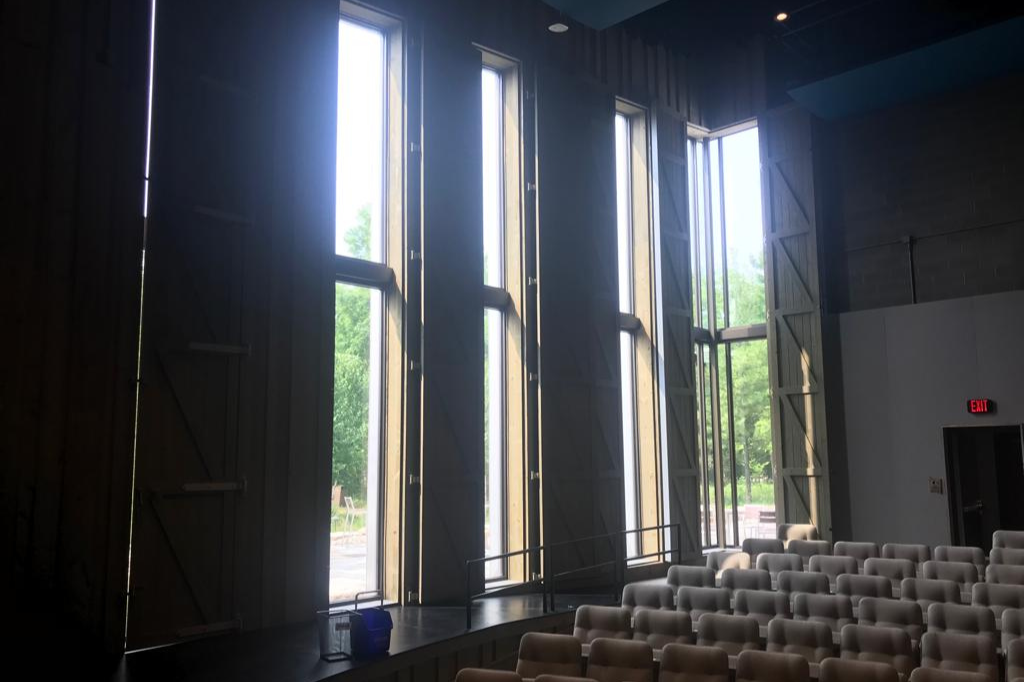
When DIY theatre means funding it yourself
The show is loosely based on a real news story: after a cheese factory was acquired by a large conglomerate, its workers managed to keep the business afloat by purchasing it with the employee lottery pool’s lucky ticket. The musical’s book by frequent Northern Sky collaborator Dave Hudson was plenty cheesy, but also managed to milk genuine pathos from its story of valuing friendship above profits with the gooey cheer of Paul Libman’s score. With high-quality production values from director Pam Kriger similar to those of Dream in High Park, combined with quirky Fringe festival-like irreverence in its script, Cheeseheads made one thing clear: local community is important to Wisconsin, as is its image of being the plucky, hardy little guy when compared to larger states with warmer climates.
This message reflected local values around theatre, where fundraising appeals to a culture of self-sufficiency. While Toronto arts organizations typically rely primarily on government grants, these theatres raise most capital funds directly from their patrons rather than depending on their state’s capricious funding. This DIY characteristic, from football to factory to festival, seems to be a Wisconsinite specialty; while it’s striking to see the amount of community wealth around the theatres, most of the donations are small, given by a large number of patrons.
Support was also the name of the game at Third Avenue PlayWorks (TAP), the only company which wasn’t currently showing original work (though it had participated in the inaugural statewide World Premiere Wisconsin festival days earlier). We toured the theatre courtesy of artistic director Jacob Janssen, who moved back to the peninsula where his family has lived for generations after working at companies in Washington D.C. and New York City.
Janssen spoke passionately about TAP as a space for community-building, adhering to the “Wisconsin Idea,” a century-old progressive tenet which states that government and educational institutions should benefit people’s lives beyond the borders of those institutions.
At TAP I saw Daddy Long Legs, a 2006 epistolary musical for two directed by Matthew Martinez Hannon. The musical by Paul Gordon and John Caird is based on pioneering writer Jean Webster’s 1912 novel about a plucky orphan who has her university education supported by a mysterious benefactor who asks that she write him regularly without ever expecting a reply. The small theatre’s house was packed with patrons admiring the beautiful set design by Sera Shearer, featuring a jet stream of letters as paper airplanes bisecting the space, and communing with the onstage band. The simple but moving show, with its message about the value of education and philanthropy in dismantling systems of class, seemed itself an advertisement for the Wisconsin Idea.
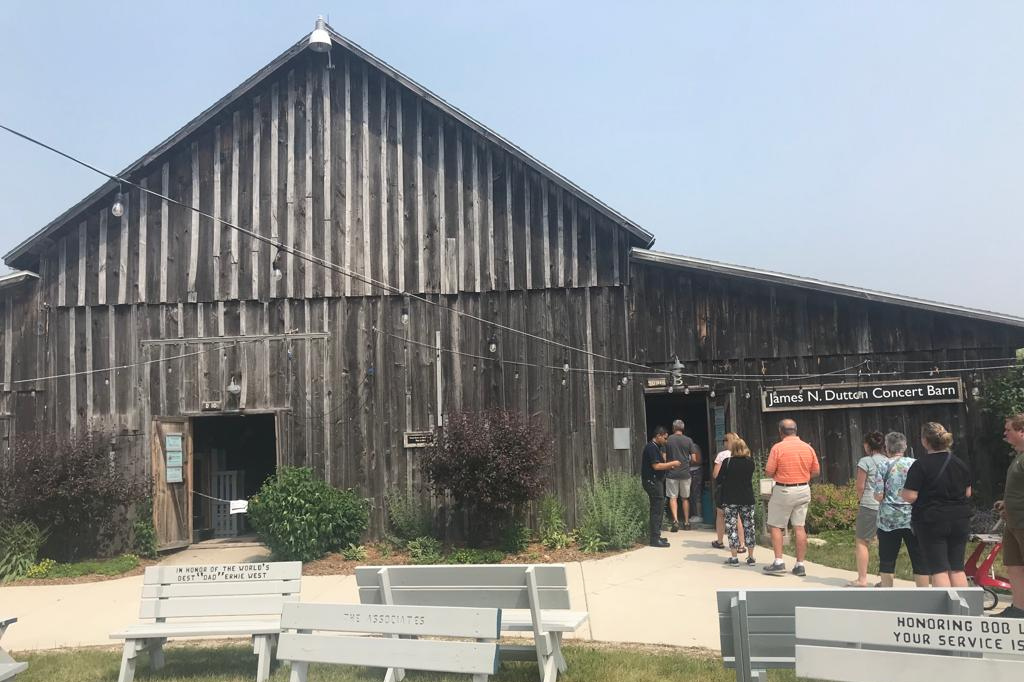
Band camp and the Bard, all outdoors
Perhaps the most fun moment of my trip was the concert that marked the end of the World Music and Percussion session of the Birch County Summer Music Academy, a band camp where most of the tuition is subsidized and students get to work with music professors from big-name universities. Many of the group of young musicians had never touched these percussion instruments two weeks prior. Now, they were bursting with excitement and joy while expertly playing Harry Styles’ “Watermelon Sugar” on steel drums in a large open-air barn, raucously applauding a charming duet between their teacher Liam Teague, called “the Paganini of the Steelpan,” and his young son.
We went from barn to Bard via Door County Shakespeare’s open air summer playground, where most productions aggressively celebrate being out in the woods; even the dressing rooms are essentially out in the open, as though you’ve stumbled on a cache of fairies doing their daily ablutions.
Door County Shakespeare performs at the Lawrence University property Björklunden, which means “birch trees by the water” in Swedish. Hosting sustainability programs year-round, the campus’ main aesthetic draw is the Boynton Chapel, a replica Norwegian stave church built from scratch by artisans Winifred and Donald Boynton in memory of Winifred’s late first husband. Door Shakespeare performs in the shadow of the chapel, keeping Winifred’s nearby walled garden landscaped with traditional Elizabethan plants.
While we weren’t able to see the promised demo of this season’s offerings — the air quality from the wildfires was deemed too poor for union actors, if not for out-of-town journalists — it was easy to imagine a spirited production of As You Like It under the massive maple tree at the middle of the company’s multi-platformed set. I reflected on the irony that this proudly carbon-free campus had been beset so by airborne carbon, but figured that, in Shakespeare’s words, the cancellation proved that “sometime[s] too hot the eye of heaven shines.”
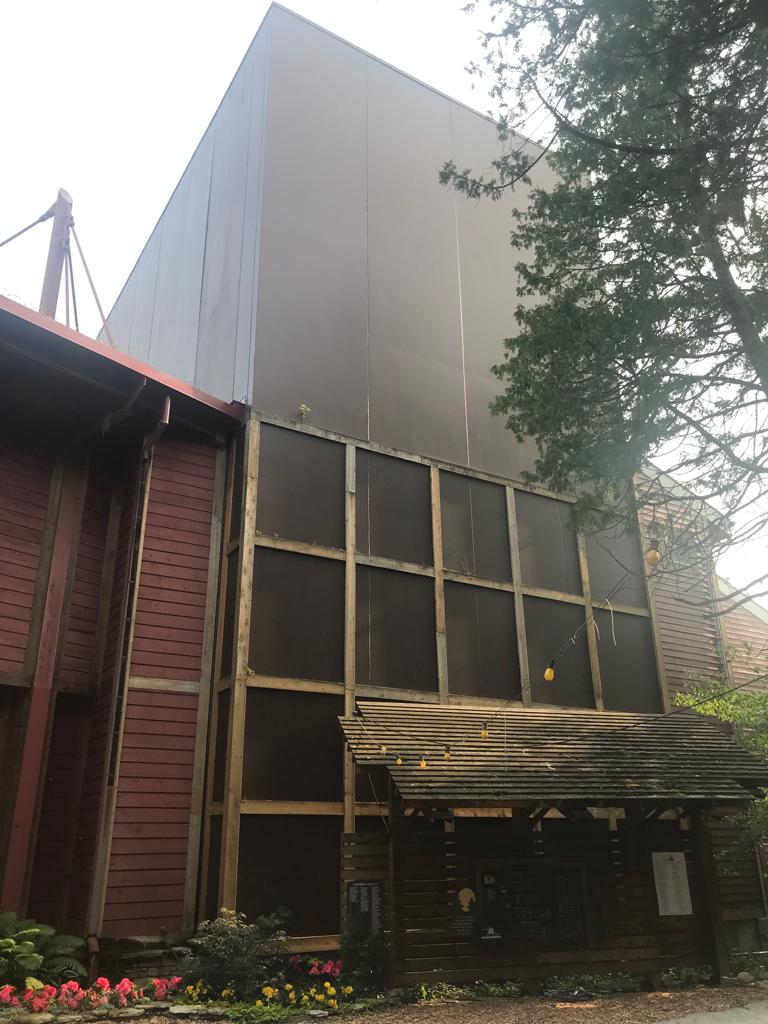
“Love and be Loved”
Finally, we toured Door County’s most venerable institution, the Peninsula Players, a full Equity house that engages an acting company for multiple consecutive shows over the season. The first theatre in the county opened in 1935 in small Fish Creek, securing its future when, two years later, it bought the 16-acre land of a defunct boys’ camp. Now, boasting over 1000 feet of shoreline, the company benefits from both its historical investment and its permanent status as a non-profit arts venue under state law. Coming from Toronto, where more and more arts organizations are forced to collaborate with condo developments or die, I marvelled at the amount of practically unspoiled wilderness serving as an arts incubator. (Of course, here, a subway wasn’t going to bring me to the theatre door.)
This amount of protected space means that, commune-like, 99% of the company’s actors, designers, crews, and multiple interns live together on the campus during the season. Peninsula was the first company to bring in artists from outside the county: managing director Brian Kelsey proudly boasts that this is where The Carol Burnett Show’s Harvey Korman “learned to improvise when he forgot his lines.” The theatre recently built two dormitories to bring the interns closer to the rest of the company, while affording them luxuries like indoor plumbing.
Peninsula was then producing a “World Premiere Wisconsin” play, A Rock Sails By, the fourth premiere it had hosted by Chicago playwright Sean Grennan and probably my favourite show of the weekend. The story of a renowned astrophysics professor struggling with the early signs of dementia was full of quirky dialogue, awe-inspiring celestial imagery highlighted by director Linda Fortunato, and even a visitor from beyond the blanket of stars we stood under during intermission. As the characters rode out to the desert to observe astronomical phenomena, I contemplated my place in the universe, perched between woods and water.
Though Peninsula has a number of glossy new buildings made of local dolomite, limestone and cedar, it’s a company that remains proud of its long history. Vestiges of the former structures remain, like the lingering light of dead stars. Kelsey pointed up to the side of one building, where an older panel was attached. In 1972, overzealous company members decorated the barn with a slogan that bled through no matter how many times it was painted over. The words are now installed there permanently:
“Love and Be Loved.”
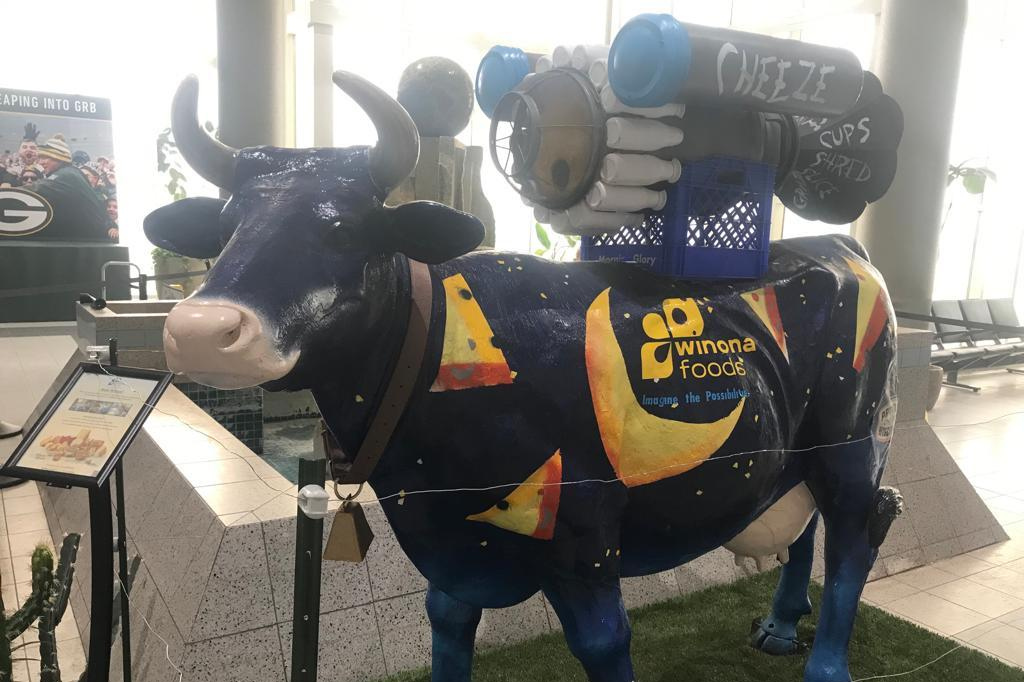
Cheese resistance is futile
With four days of good theatre filling my mind and four pounds of cheese curds filling my colon, I departed Wisconsin with a wave to the airport’s jetpack-bearing cow.
I reflected back to my first night in Door County, before the wildfires choked out the outdoor theatre scene entirely, watching Cheeseheads: The Musical! The play’s outsider character, a representative of the Texas cheese conglomerate, goes from antagonist to found family as she’s slowly converted to the Wisconsin Idea.
With brie-ful bombast, the musical encourages her to join the ranks by exclaiming, “I am a cheesehead!” The rest of the enthusiastic cast follows in turn, beckoning the audience to rise and shout in turn, like a chorus of Stilton Spartacuses. It began feeling silly and awkward, but soon most of the patrons were on their feet, myself included – wanting to be a part of a collective in a world literally on fire, in this strange state of Wisconsin that promotes self-reliance through others, this melting pot half Fond du Lac and half fondue.
In that moment, I, too, was a cheesehead.
Ilana Lucas travelled to Wisconsin courtesy of Destination Door County.

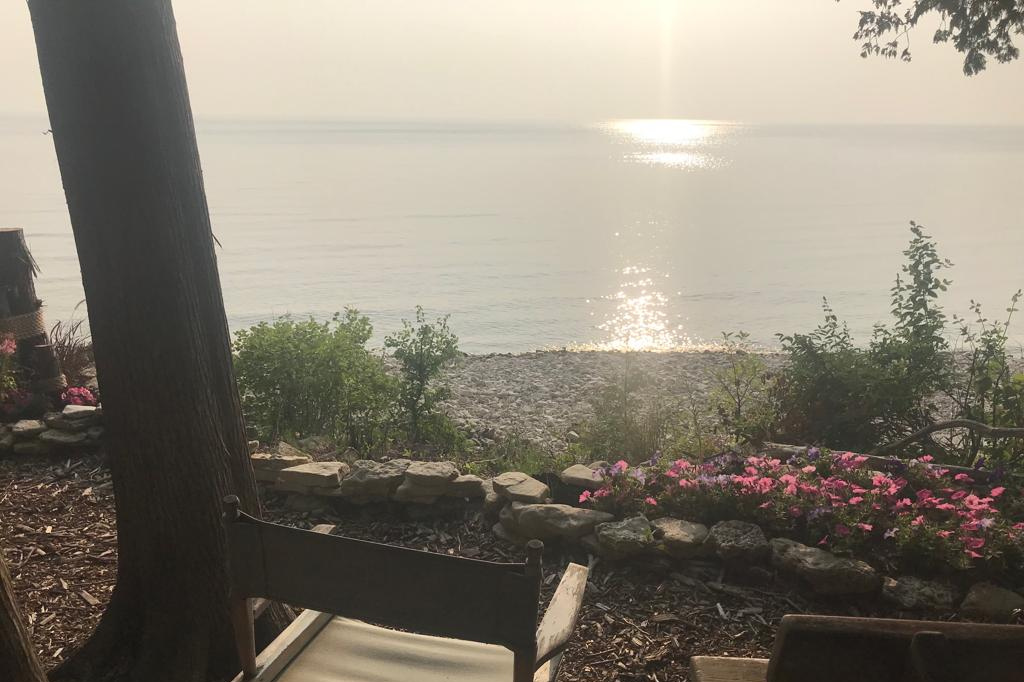








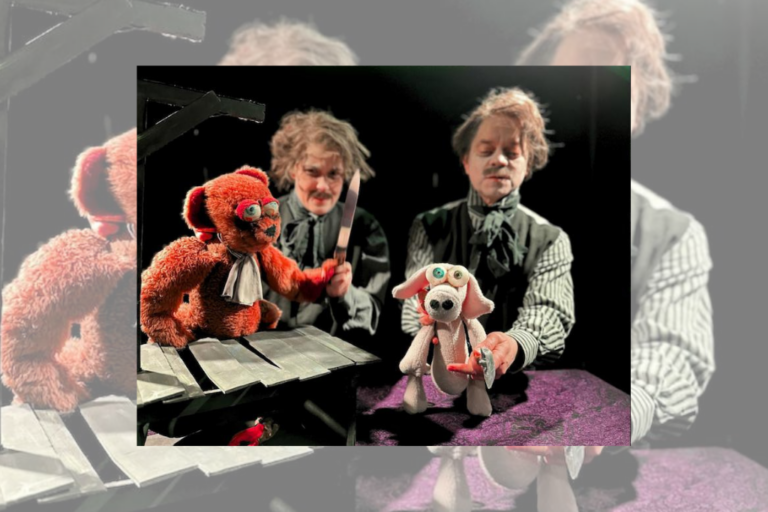
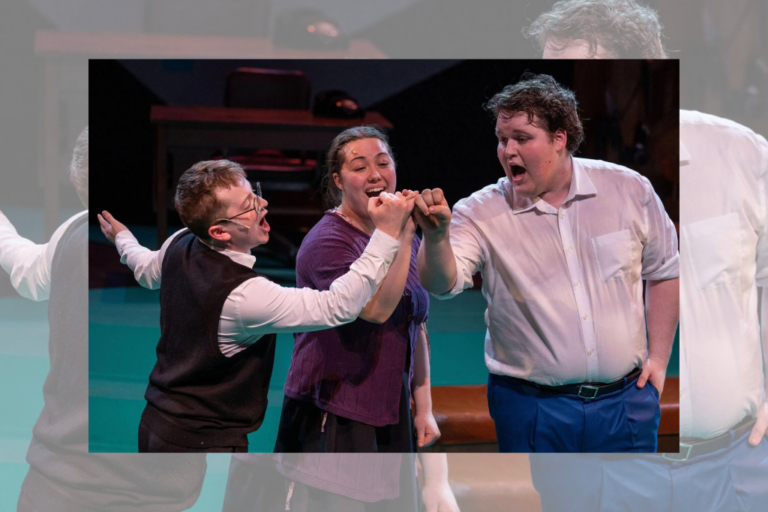
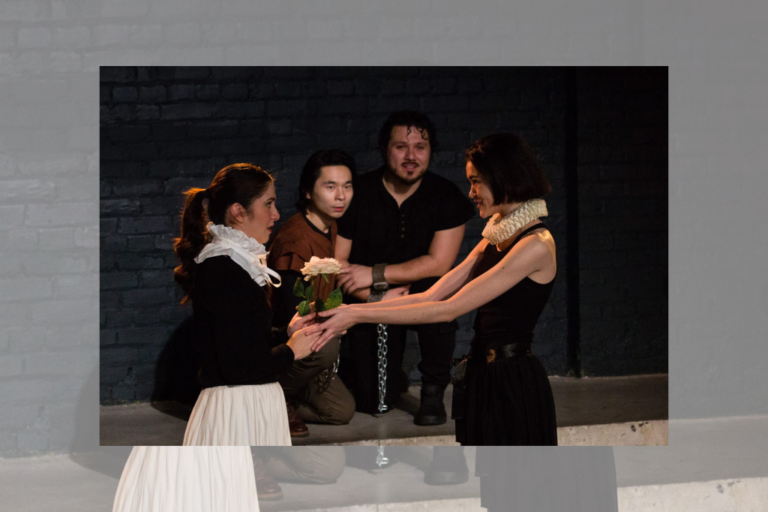


Comments